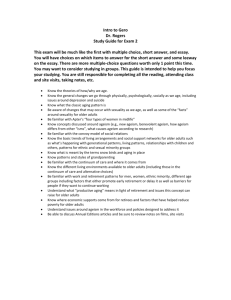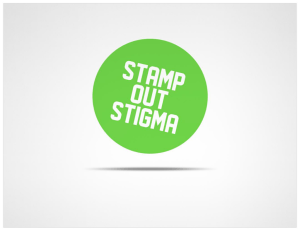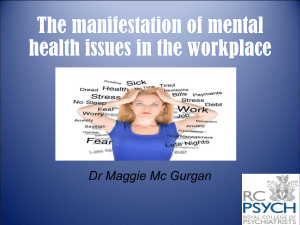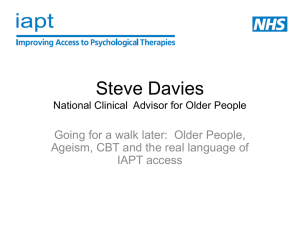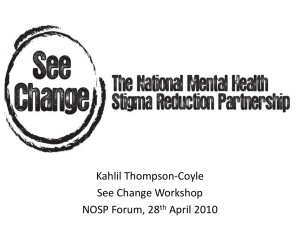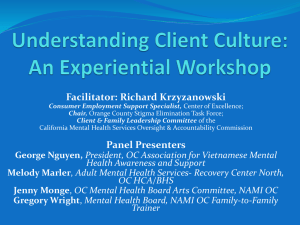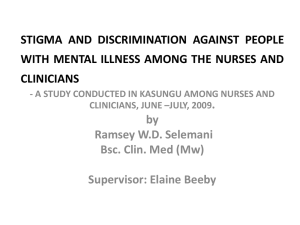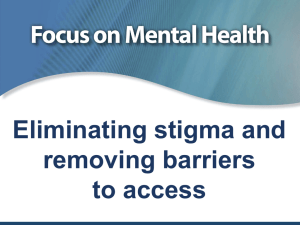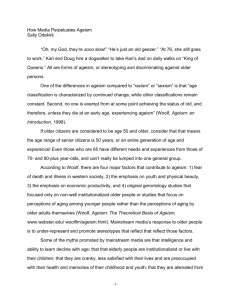Stigma and Discrimination in the Elderly
advertisement
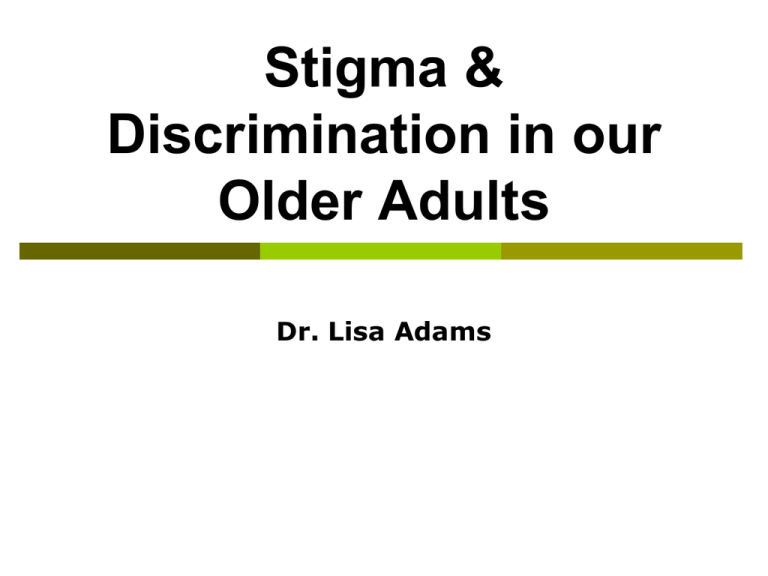
Stigma & Discrimination in our Older Adults Dr. Lisa Adams Overview Media headlines Define terms Specifics of stigma and ageism Causes Effects Growing older: What it is and isn’t Your response This man The elderly man that lives by himself down the road from your house, you call him a crusty old man- he is actually a retired medical doctor & sergeant from the 2nd world war You call him antisocial- he keeps much to himself b/c he promised his deceased wife he would take care of the house and garden for hersomething they always did together. It helps him pass the time. You call him feeble and weak- he is a strong, healthy vibrant elderly man. He toiled the soil that helped build the health care system you use today. You think he is disfigured & odd- He fought in the 2nd world war and stepped on a landmine and actually has 2 stumps for legs. He helped you to enjoy the freedom you have today. He doesn’t seem to smile much & looks crooked- he still suffers with a broken heart and is missing his wife, who was the love of his life and his best friend for 60 years. They didn’t have any children. Recent Media Headlines “Ageism” accepted in society “Our seniors are being treated poorly” “Seniors being looked down on…” “Ponzi scheme” Definitions a severe social disapproval of personal characteristics or beliefs that are against cultural norms. Recognizes differentiation of others and marked devaluation of a particularly group of people Older adults AGEISM 3 elements of Ageism Prejudice attitudes towards the aged, towards old age, and towards the aging process; Discriminatory practices against the elderly, particularly in employment, but in other social roles as well; and Institutional policies and procedures which perpetuate stereotypic beliefs about the elderly, reduce their opportunities for a satisfactory life and undermine their personal dignity. Translated, it simply means….. Stigma unfortunately is a failure of our society Ageism is the biggest disgrace of mankind They serve absolutely no purpose!!!! Do people not think that you are going to grow old!!! What do you see in this picture? Eyes Her attire Her focus Her interest Her firm stance Her weathered skin One Myth Myth: Mental illness is an old person’s illness. Fact: Depression is concentrated among men and women in their prime working years, and in their children. Young people between 15 and 24 years of age are most likely to experience a mental disorder. Social Stigma in most cases When people are isolated socially and they start losing their social identity and their social structure starts dissolving (not being invited to social events, loss of communication with loved ones, not being visited, loss of friendships, etc.). But there is also the loss of privacy, the fact that your illness is forced into the open. Causes Elder abuse Domination Failed society Failed parenting of today’s children Media portrayals “The love of beauty” Arrogance Ignorance Disrespect Not knowing the difference Differences b/t young and old You worked much harder for what you have, times were tough You didn’t rely on technology, you did it yourself. Hand me downs instead of designer clothing A greater sense of pride Greater fortitude and strength Knowledge base that no one can surpass Intellect and understanding beyond compare Effects of Stigma helplessness Detrimental to one’s health Anxiety Loss of productivity Depression Loss of self esteem Shorter life The Harm it causes Humiliation Treatment shy Does not mean you have a weak “mind” Embarrassment/shame Disheartened Disinterest Anger fear distrust What is growing older? A natural life event A beautiful process An opportunity to embrace The creation of a seasoned entity Collection of memories Celebration of human diversity Enrichment of a lived experience and knowledge base Continued and valuable role in society What have you achieved? Even as a stay at home mom you have contributed to society more than you will ever know. Laborious work (my own mother) What you have put your mind to What you have put your heart into The friends and families that you have supported and took care of Knowledge, wisdom & courage The Great Depression, the epidemics What it isn’t Not a deviant condition Not a shameful event Not a social problem Not a threat to society It is not a different person, a different lifestyle or different needs= we are all still one in the same, regardless of our age, color, ethnicity, etc. Why subject yourself? You wouldn't think of going through life with a broken arm dangling at a twisted angle. You would get it fixed. So why do it for how stigma makes you feel? A mental illness is no different than a physical illness; both of which can be disabling. What to do Seeking help to overcome any level of depression, anxiety, stress or tension is a sign of emotional strength. It is a positive indication that you want to take charge of your life! If you are in pain, please don't ignore it. Don't let a false sense of pride keep you from feeling better. You are always in control Tap into your resources and supports More of what you can do? Reflect upon your own ageism. Start noticing older people around you. Be considerate of older people's well-being. Show respect through manners that acknowledge the greater breadth of wisdom and life experience of each older person. Avoid assuming helplessness. Share memories. Be a teacher too. Consider nurturing cross-generational activities in your local community to help every generation learn the benefits of stepping outside of its own generational mindset. Remember, one day being older will be you. Key Lessons Only regret those things you didn’t get to do in life; don’t regret the things you have done This is not your doing or your fault The issue itself does not rest with you, you did not create it The real issues lies with those who practice ageism and/or stigma towards older adults Rise above the inaccuracies of stigma and ageism This is just one example http://www.youtube.com/watch?v=fY79K bCptTo Hurricane Hazel Mayor of Mississauga, Ontario for 31 years Questions/discussion Thank you for your attention!!! Lisa Adams Contact Info.: lyadams@ualberta.ca Phone: 709-729-2502
